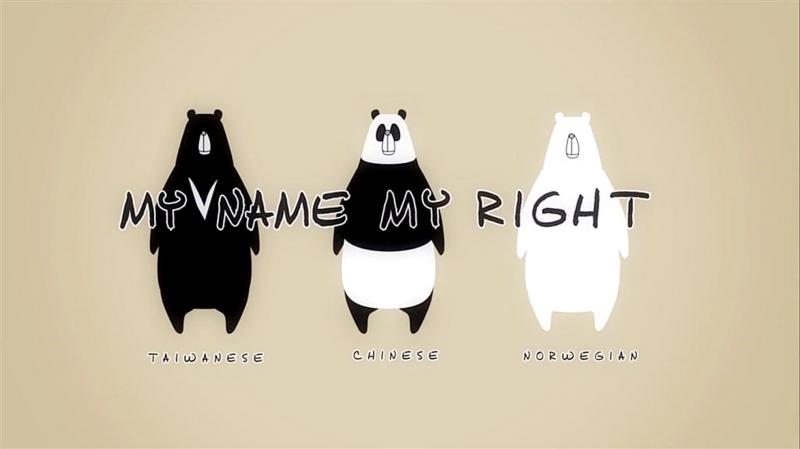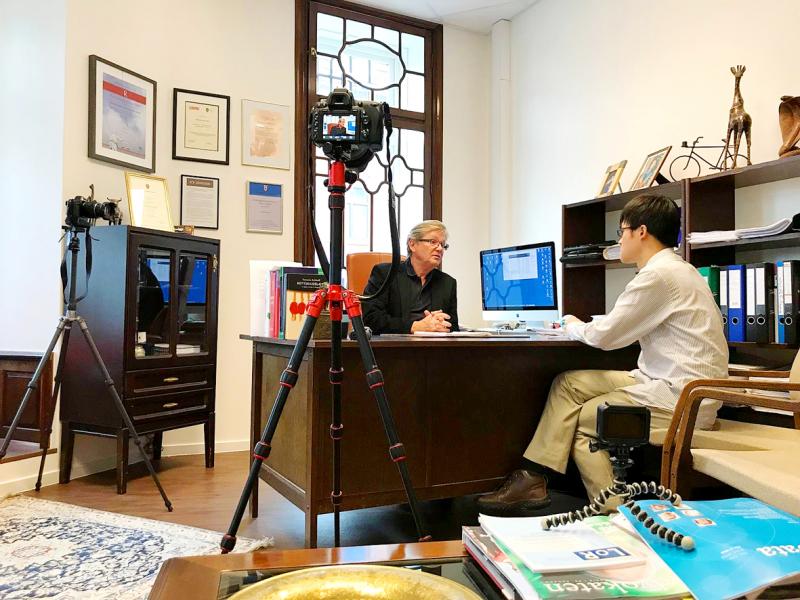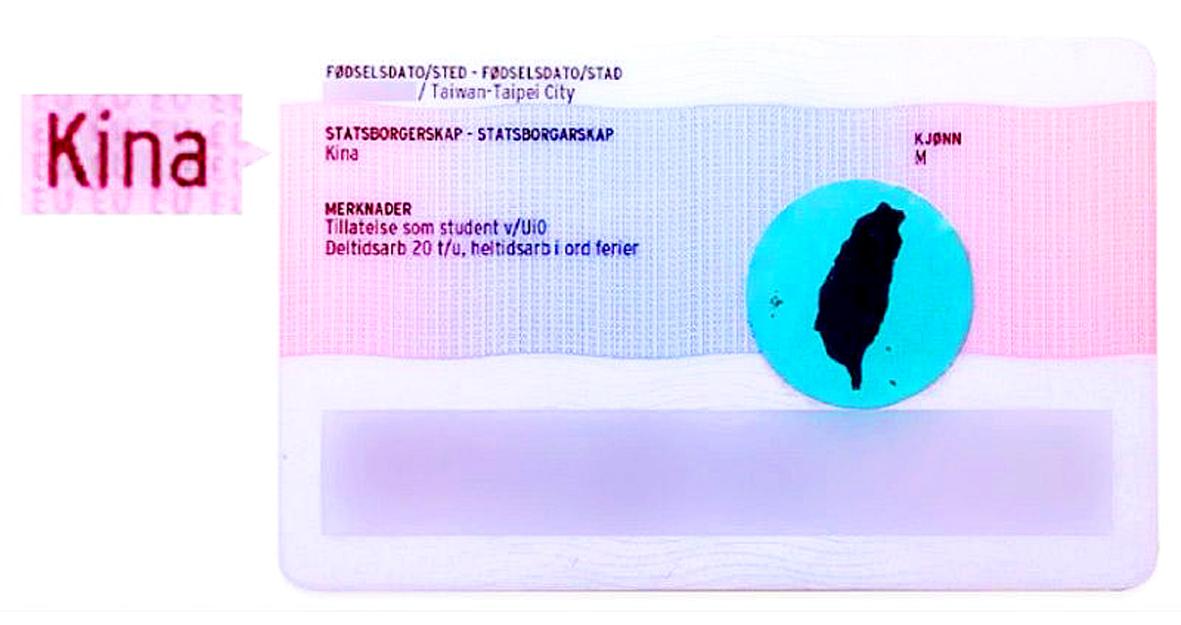Joseph Liu chose Norway for his legal studies because he wanted to learn more about human rights. But instead, he’s been fighting the Norwegian government for the past four years for the right to use his national identity.
Following a diplomatic row with China in 2010, Norway changed the nationality of its Taiwanese residents to “Chinese.” Liu and others launched the My Name, My Right movement to raise funds and pressure the authorities to change the country designation back to Taiwan. They eventually took the case to the Norwegian supreme court, where they lost in November last year.
While the outcome wasn’t surprising, “we didn’t even have a chance to represent ourselves in court,” Liu says. “The judge just rejected us on grounds that our allegations were unfounded. I’m quite disappointed in Norway’s legal system.”

Photo courtesy of My Name, My Right
Liu and his team filed a lawsuit last month with the European Court of Human Rights (ECHR) in France, where they now have to wait up to a year to see if the case is accepted due to the court’s enormous caseload. As of the end of April, there were about 65,000 pending cases.
If the ECHR rejects the lawsuit, Liu plans to either help Taiwanese in other countries who have similar issues, or bring the issue to the UN.
“It doesn’t matter if we win or not, but we need to keep speaking out,” he says. “If we remain silent, then it will become difficult in the future for Taiwanese to exercise their right to self-determination. Not saying anything means that we’ve quietly accepted the fact of being designated as Chinese.”

Photo courtesy of My Name, My Right
“If this lawsuit wins, it would be the first time for the European Court of Human Rights to make a decision related to national identity,” states a My Name, My Right press release. Since the ECHR is binding on the 47 member states that have signed the European Convention on Human Rights, it means that these countries could no longer register Taiwanese citizens as “Chinese.”
FALTERING TIES
Tensions between Norway and China rose in early 2010 after late Chinese democracy activist Liu Xiaobo (劉曉波) was nominated for the Nobel Peace Prize. Shortly after that, Taiwanese in Norway were forced to identify as “Chinese” to demonstrate the government’s adherence to the one-China principle.

Photo courtesy of My Name, My Right
Taiwan currently has no representative office in Norway — it ceased to operate in 2017 and now all matters go through the office in Sweden.
“It’s really hard for us to make our voices heard,” Liu says. “There used to be a pro-Taiwan group in the parliament, but no longer. We can rally people, but we’re finding it hard to do the same in politics and push them to support some Taiwan-friendly policies.”
For the ECHR battle, Liu has recruited London-based lawyer Schona Jolly, who is chair of the Bar Human Rights Committee and has written about Chinese human rights issues.
Jill Marshall of the Department of Law and Criminology at Royal Holloway College, University of London, said that how a person’s identity is recorded on official documents is a very important matter. It simplifies the complex question of “who we are” into a few words on a document, which may affect people’s rights.
“The applicants are Taiwanese: failing to state this on their official documentation and instead ascribing them with an incorrect nationality misidentifies them and violates their right to personal identity. It is only just and fair that the ECHR acknowledges the violation that has occurred,” said Marshall, who is also the author of Human Rights Law and Personal Identity.”
RAISING TAIWAN’S PROFILE
Liu and his group launched an online fundraising campaign to support their lawsuits, receiving more than NT$3 million.
However, nothing they tried could get through to the courts. They were told that they had no sufficient grounds to their claim due to state policy toward China, and that the designation “would have no consequences and practical significance to their rights and obligations in Norway.”
There are obvious differences, however, as Taiwanese don’t need a visa to get into Norway while Chinese do. There are also different policies toward the two groups due to the vastly different conditions of their home countries.
“Growing up in Taiwan, it was ingrained in us that Taiwan and China are two different entities. China has been threatening Taiwan on all fronts these days, so registering me as “Chinese” is very offensive,” he says.
But Liu feels that popular sentiment has been changing over, as China expands its influence across the globe. When the Liu Xiaobo Incident broke out in 2010, most of Europe was still trying to cozy up to China for economic gain.
“They cast the Taiwan problem aside then because they wanted to be friends with China,” Liu says. “But people are starting to realize the vast differences in ideology and have become wary [of China] ... Technically, there’s little benefit to being nice to Taiwan. But people’s views of Taiwan have changed, especially with the attention it got during the epidemic. Our differences were emphasized in media reports and more people are aware of the problem now.”
Compared to four years ago, Liu has seen an increase in local Norwegians announcing their support for the lawsuit. This is exactly what Liu wants.
“The lawsuit is important. But even more important is that this is an opportunity for more people to know about Taiwan.”
For more information, visit www.facebook.com/TaiwanMyNameMyRight

Taiwan has next to no political engagement in Myanmar, either with the ruling military junta nor the dozens of armed groups who’ve in the last five years taken over around two-thirds of the nation’s territory in a sprawling, patchwork civil war. But early last month, the leader of one relatively minor Burmese revolutionary faction, General Nerdah Bomya, who is also an alleged war criminal, made a low key visit to Taipei, where he met with a member of President William Lai’s (賴清德) staff, a retired Taiwanese military official and several academics. “I feel like Taiwan is a good example of

March 2 to March 8 Gunfire rang out along the shore of the frontline island of Lieyu (烈嶼) on a foggy afternoon on March 7, 1987. By the time it was over, about 20 unarmed Vietnamese refugees — men, women, elderly and children — were dead. They were hastily buried, followed by decades of silence. Months later, opposition politicians and journalists tried to uncover what had happened, but conflicting accounts only deepened the confusion. One version suggested that government troops had mistakenly killed their own operatives attempting to return home from Vietnam. The military maintained that the

Jacques Poissant’s suffering stopped the day he asked his daughter if it would be “cowardly to ask to be helped to die.” The retired Canadian insurance adviser was 93, and “was wasting away” after a long battle with prostate cancer. “He no longer had any zest for life,” Josee Poissant said. Last year her mother made the same choice at 96 when she realized she would not be getting out of hospital. She died surrounded by her children and their partners listening to the music she loved. “She was at peace. She sang until she went to sleep.” Josee Poissant remembers it as a beautiful

Before the last section of the round-the-island railway was electrified, one old blue train still chugged back and forth between Pingtung County’s Fangliao (枋寮) and Taitung (台東) stations once a day. It was so slow, was so hot (it had no air conditioning) and covered such a short distance, that the low fare still failed to attract many riders. This relic of the past was finally retired when the South Link Line was fully electrified on Dec. 23, 2020. A wave of nostalgia surrounded the termination of the Ordinary Train service, as these train carriages had been in use for decades